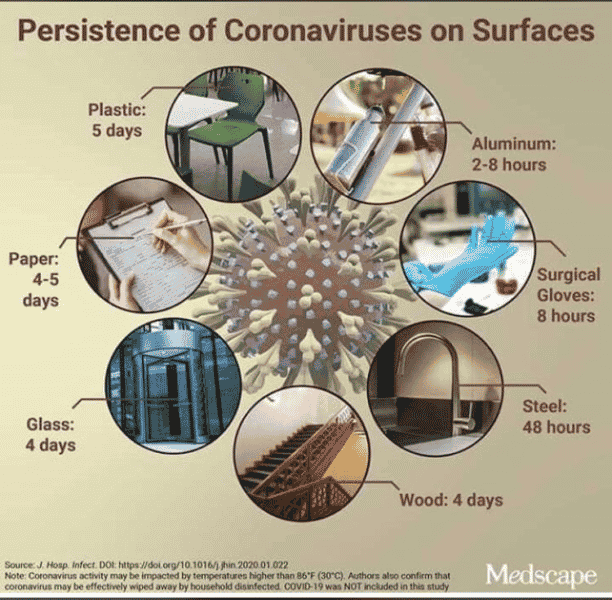
How long the coronavirus survives on surfaces
How long the coronavirus survives on surfaces
- in the air for 3 hours
- on copper for 4 hours
- on cardboard for 1 day
- on stainless and plastic for 3 days
A new study from researchers at the National Institutes of Health (NIH) suggests that the coronavirus can live up to four hours on copper, up to a day on cardboard, and up to three days on plastic and stainless steel.

The coronavirus can also live in the air for up to three hours, the study authors found.
“How long coronavirus survives is also determined by the surface texture – smooth, nonporous surfaces like doorknobs and tabletops are better at carrying viruses in general. Porous surfaces – like money, hair, and fabric – don’t allow viruses to survive as long because the small spaces or holes in them can trap the microbe and prevent its transfer,” says Rachel Graham, an epidemiologist at the University of North Carolina.
“Coins will transmit a virus better than cash, but this shouldn’t be a huge concern,” she said
Higher humidity, moderate temperatures, low wind, and a solid surface are all good for a coronavirus’ survival.
Being the lifeline of any economy, the trucking industry may not stop because of the ongoing coronavirus pandemic hence trucking companies need to equip their employees with enough knowledge and materials to keep them safe from infection.
As truck drivers interact with such surfaces in their everyday duties it’s important to know when to be extra cautious.
Personally, when I was still doing container freight, at the offloading bay I would help my clients, for a few rands, of course, today it will be a big NO.
SA Trucker has been flooded with posts and suggestions on how to deal with the deadly virus. Just recently a trucker asked how safe it was to give the traffic official his licence card when asked to and the post drew a lot of reactions which mainly showed concern of not enough being done to protect the trucker and motorists at large.
Read also: What would happen to South Africa if trucks stopped their service
The official had gloves to protect himself but his interaction with many licence cards means if the virus was there it indeed was transferred to other licence cards.
If you touch a surface or object that has viral particles on it and then touch your mouth, nose, or eyes you may get the coronavirus.
When an infected person coughs or sneezes, droplets carrying viral particles can land on someone else’s nose or mouth or get inhaled
As a trucker you need to make sure that you are safe by avoiding contact with surfaces that may be infected, if contact cannot be avoided, to protect yourself against infection by wearing gloves.
Coronaviruses could be “efficiently inactivated” on surfaces within one minute if they’re cleaned with solutions containing 62% to 71% ethanol alcohol, 0.5% hydrogen peroxide, or 0.1% sodium hypochlorite.
But alcohol-based hand sanitiser is not ideal for disinfecting hard surfaces because the alcohol content is not high enough.
Stop touching your face, and wash your hands
Medical experts have emphasised the importance of washing your hands and not touching your face – those are the best ways to minimise your chance of picking up the coronavirus from surfaces.
“If you’re about to eat, climb back into your truck, play with the baby, etc., wash your hands.”
It’s not easy for most people as we touch our faces several hundreds of times per day, so it’s still best to be aware of how clean your hands are.





